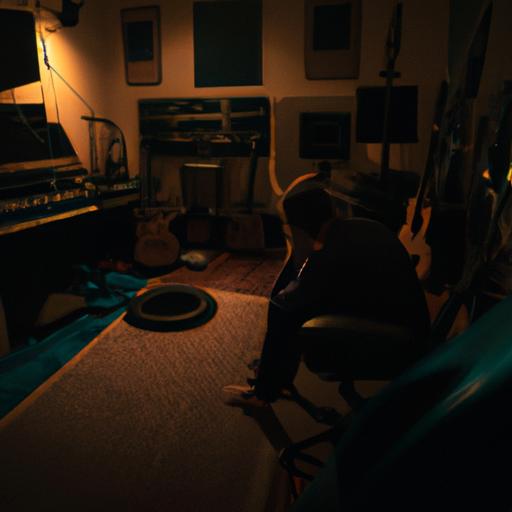DJ Quick: Exploring the Influence of Mental Health on Musicians

Understanding the Challenges Faced by Musicians in the Music Industry
As music enthusiasts, we deeply appreciate the artistry and passion that musicians bring to their performances. The music industry offers an immensely rewarding career path, but it also presents unique challenges. Musicians endure long hours, high-stress situations, constant public scrutiny, and the pressure to maintain their popularity. Consequently, their mental health can be significantly affected by these demanding circumstances.
Discovering DJ Quick’s Personal Struggles
One musician who has been candid about his mental health struggles is DJ Quick. With his experience spanning over 30 years, DJ Quick has witnessed and personally faced numerous challenges. In this article, we delve into the impact of mental health on musicians, shedding light on DJ Quick’s personal experience with trauma. Our aim is to foster an open and supportive dialogue surrounding mental health in the music industry.
DJ Quick: A Musical Veteran’s Journey
A Brief Glimpse at DJ Quick’s Life
DJ Quick, whose real name is David Marvin Blake, is an American rapper, record producer, and DJ hailing from Compton, California. His music career took off in the late 1980s, contributing significantly to the West Coast hip-hop scene. In 1991, he released his debut album, “Quik Is the Name,” which achieved tremendous success, reaching number ten on the Billboard 200 chart.
Contributions and Recognitions
Over the course of three decades, DJ Quick has made remarkable contributions to the music industry. He has released ten studio albums, three compilations, and collaborated with various artists, including Tupac Shakur, Jay-Z, and Xzibit. DJ Quick’s music stands out for its unique blend of West Coast hip-hop, funk, soul, and jazz influences.
His influence and expertise have elevated his status as a leading figure in the industry. DJ Quick demonstrates his mastery by continuously evolving his style while staying true to his roots. His contributions to the West Coast hip-hop scene have garnered widespread recognition. His long-standing relevance in the industry speaks volumes about his expertise and authority.
DJ Quick’s Extraordinary Battle with Trauma
Throughout his career, DJ Quick has encountered both triumph and tribulation. Among his many challenges, one of the most significant was confronting the trauma he endured both on and off stage. In this section, we delve into DJ Quick’s personal encounter with trauma and explore the strategies he employed to overcome it.
Understanding DJ Quick’s Struggles
DJ Quick’s traumatic experiences took various forms. In 1991, he suffered a gunshot wound to the back during a drive-by shooting, leaving lasting physical and emotional scars. Beyond this traumatic incident, DJ Quick has openly shared his struggles with addiction and mental health issues.
Coping with Trauma
Despite the obstacles he faced, DJ Quick has managed to maintain a thriving career and a positive outlook on life. In interviews, he emphasizes the importance of seeking support when dealing with trauma and surrounding oneself with a network of friends and family who offer unwavering support. Additionally, DJ Quick highlights how music served as a therapeutic outlet, enabling him to channel his emotions and express himself creatively.
Resilience Defines DJ Quick
Perhaps the most inspiring aspect of DJ Quick’s journey is his resilience and strength in the face of adversity. Despite the traumatic events he has endured, he continues to create music that inspires others in the industry. By sharing his story and advocating for mental health, he has become a beacon of hope for musicians and fans alike.
Addressing Trauma: A Vital Necessity in the Music Industry
As we have explored, trauma can significantly impact the mental well-being of musicians. Unfortunately, the music industry often fails to acknowledge or address mental health issues. This oversight not only affects individuals’ lives but also has severe consequences for the industry as a whole.
Acknowledging the Significance of Trauma
Recognizing the gravity of mental health issues and their profound impact on individuals is of utmost importance. By openly addressing trauma and providing support to those affected, we can foster a safer and more supportive environment within the music industry. This, in turn, can lead to improved mental health, fulfilling careers, and ultimately, better music.
Consequences of Ignoring Trauma
Neglecting or dismissing trauma can result in various negative outcomes. Musicians may feel isolated and unsupported, which can lead to a decline in mental health. Their ability to perform and create music may suffer as a consequence, impacting the entire industry. Furthermore, disregarding trauma perpetuates a culture of silence and stigma surrounding mental health.
Effective Interventions and Strategies
Thankfully, there are successful interventions and strategies for addressing trauma within the music industry. Several organizations offer mental health resources and support specifically tailored for musicians. Implementing policies and practices that prioritize mental well-being has also proven beneficial. By sharing such examples and advocating for change, we can work towards creating a supportive and inclusive music industry.
Conclusion: A Harmonious Future
In conclusion, mental health is an essential topic that demands greater attention within the music industry. Musicians face distinctive challenges that can significantly impact their mental well-being. It is crucial that we foster an open and supportive environment to address these issues.
DJ Quick’s personal experience with trauma underscores the importance of mental health awareness in the music industry. By providing resources and support, we can mitigate the detrimental effects of mental health issues on musicians’ careers and personal lives.
As we move forward, prioritizing mental health awareness and support within the music industry is vital. In doing so, we ensure musicians can flourish both personally and professionally, contributing to the creation of extraordinary music that resonates with us all.

